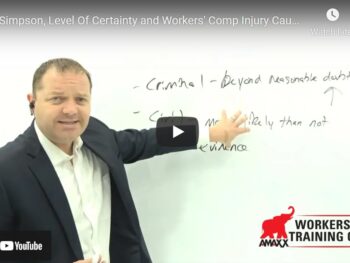In recent years, the New York Workers Compensation Board (NY WCB) has begun to enforce rigorously “voluntary withdrawal from labor” as a reason for discontinuing wage loss benefits, even where the worker is found to be permanently partially disabled. But, what if the worker is partially disabled but becomes further disabled from a later condition?
A new decision, Matter of “Bobbitt v Charbonneau Construction,” 2011 NY Slip Op 04790, Decided on June 9, 2011, Appellate Division, Third Department states other medical conditions do not alleviate a worker’s responsibility to continue to seek employment within the worker’s capacities, even though the capacities are diminished. This opinion is uncorrected and subject to revision before publication in the Official Report.
Click Link to Access Free PDF Download
“Avoid the 3 Primary Reasons Injured Workers’ Hire Attorneys”
Therefore, an employer should make sure its carrier/TPA has the means to investigate the effects of unrelated medical conditions to ensure a proper defense can be maintained. At the very least, the carrier should be advised whenever workers are covered by group or individual medical insurance and who the insurers might be. The existence and identity of such plans does not violate principles of privacy or confidentiality. Obtaining the records can be done by lawful means, but only if one knows upon whom to serve the proper papers.
The decision is not, and will not be, an isolated exception. The very workers most likely to become permanently partially disabled are those, especially by reason of age, who are most likely to have other problems. Almost a third of all workers, according to a 1980s federal study, have some form of permanent medical condition. For workers on permanent compensation disability the number well exceeds two thirds.
New York lawyers recently considered every way around the rules for voluntary withdrawal. “Unrelated medical disability” seems to be a possibility. With proper investigation, it need not be. A proper investigation can show many conditions sounding conclusively disabling are, in fact, transitory or do not actually effect work activity.
Every employer has the right to expect its claims to receive proper investigation by its carrier/TPA. A carrier not following up should be alerted to the existence of such decisions as “Bobbitt.” Claimant admitted that he has not worked nor sought employment since shortly after his accident and has failed to participate in vocational and educational services to which he was referred. Thus, substantial evidence supports the Board’s determination that claimant’s separation from the labor market is voluntary in that it is due to causes other than his compensable injuries.
Author Attorney Theodore Ronca is a practicing lawyer from Aquebogue, New York. He is a frequent writer and speaker, and has represented employers in the areas of workers compensation, Social Security disability, employee disability plans, and subrogation for over 30 years. Mr. Ronca has 21 years experience in searching and retrieving medical records and many other types of documents for defense of workers compensation claims. Contact Attorney Ronca at 631-722-2100 or medsearch7@optonline.net.
FREE TOOLS
WC BOOKS: http://www.LowerWC.com/workers-comp-books-manuals.php
WORK COMP CALCULATOR: http://www.LowerWC.com/calculator.php
MODIFIED DUTY CALCULATOR: http://www.LowerWC.com/transitional-duty-cost-calculator.php
JOIN WC GROUP: http://www.linkedin.com/groups?homeNewMember=&gid=1922050/
SUBSCRIBE TO: Workers Comp Resource Center Newsletter
Do not use this information without independent verification. All state laws vary. You should consult with your insurance broker or agent about workers comp issues.
©2011 Amaxx Risk Solutions, Inc. All rights reserved under International Copyright Law. If you would like permission to reprint this material, contact Info@ReduceYourWorkersComp.com






















